Delve into the captivating tale of Prometheus, the Greek fire god and friend of mankind. From his defiance of Zeus to the daring theft of fire, explore the myth of Prometheus, his benevolent gifts to humanity, and the enduring symbolism of his resilience against greater powers.

Prometheus; Literal meaning: ‘forethought’. The Greek fire god and friend of mankind; the son of the Titan Iapetus and Clymene, a nymph, and brother of Atlas, Menoetius, and Epimetheus. Hostile to Zeus, the sons of Iapetus found their match in the wide-seeing sky god, though Prometheus himself gained a Pyrrhic victory by enduring torture and not revealing his secret knowledge of future events. He was aware that if Zeus had a child by the goddess Thetis, their son would displace Zeus as chief of the gods. Zeus struck down ‘overweening’ Menoetius with lightning, obliged ‘ nibborn’ Atlas to prop up the sky, gave disastrous Pandora to ‘foolish’ metheus, and chained ‘subtle-counselled’ Prometheus on a rock ending in the daytime an eagle to consume his immortal liver, which was restored each succeeding night. The hero Heracles may have released the uffering fire god, without the consent of the Olympian gods.
According to Hesiod, writing in the seventh century bc, there were five races corresponding to the five ages of the world: these were the Golden, the contented subjects of Kronos; the short-lived Silver, who were made impious by Prometheus; the ferocious Bronze, unnamed devotees of Ares warriors predestined for the underworld; the Heroic, their more honourable successors; and, finally, the Iron, whose members include hesiod and ourselves. The iron race will not cease from grief and destruction till Zeus sweeps it away, like its four predecessors. The original abundance of the earth—from which mankind sprang—was withdrawn by Zeus after Prometheus had taught men to cheat the former of his due share of sacrifices. Also taken back was fire, an element indispensable for civilization. Prometheus dared to steal a flame, either from the workshop of Hephaistos or from the hearth of the gods on Mount Olympus, and Zeus retaliated by promising the creation of evil. This was Pandora, ‘all-gifted’, whom Hephaistos constructed at Zeus’ request. Despite the warning of Prometheus about not accepting gifts, Epimetheus welcomed Pandora and her jug, from which issued ‘all the baneful cares of mankind’. Thereafter the division between mortals and immortals was clearly apparent.
Prometheus is an ambivalent figure. He contains two conflicting aspects of the divine helper: fire was his gift to mankind, in some tales even life itself; but the price of technological advance was the grief and destruction typical of the Iron Age. Two steps forward and one step back: compared with the Golden Age, perhaps three steps backwards. Yet Prometheus remains an appealing symbol, the personification of the unconquerable will opposing greater power, forever chained and sufferine but confident of the ultimate triumph of his cause.

Story of Greek God Prometheus
Prometheus is a prominent figure in Greek mythology, known for his cunning and benevolent acts toward humanity. Here is the story of Prometheus:
Creation of Humans: Prometheus was a Titan, a race of powerful beings preceding the Olympian gods. During the Titanomachy, the war between the Titans and the Olympians, Prometheus sided with Zeus and the other Olympian gods. As a result, after the Olympians emerged victorious, Prometheus was spared imprisonment in Tartarus, unlike many other Titans.
Theft of Fire: Prometheus, whose name means “forethought,” was often depicted as a benefactor to humankind. The most famous episode involving Prometheus is the theft of fire. According to the myth, after creating humans out of clay, Zeus, the king of the gods, sought to limit their power and keep them subservient.
Prometheus, moved by compassion for the newly created humans, defied Zeus’ will. In a daring act, he ascended to Mount Olympus, the realm of the gods, and stole fire from the hearth of the gods. Fire represented knowledge, civilization, and the ability to create, marking a crucial turning point in the development of humanity.
Gift of Fire and Punishment: Prometheus then gifted the stolen fire to humanity, along with various arts and sciences, including mathematics, agriculture, medicine, and metalworking. This generous act elevated humans above other creatures and allowed them to develop civilization.
Zeus, furious at Prometheus for defying his authority and empowering humans, decided to punish both Prometheus and humanity. To torment Prometheus, Zeus ordered the creation of Pandora, the first woman, who brought with her a jar (often mistakenly referred to as a box) containing all the evils of the world. Prometheus was chained to a rock on Mount Caucasus, and each day, an eagle (or vulture) sent by Zeus would eat his liver, which regenerated overnight due to Prometheus’ immortal nature.
Herakles (Hercules) and Freedom: The hero Herakles (Hercules) eventually came to Prometheus’ aid during his Twelve Labors. As one of his tasks, Herakles killed the eagle, freeing Prometheus from his torment. In some versions of the myth, Prometheus was eventually pardoned by Zeus, while in others, he remained bound to the rock.
Legacy: Prometheus symbolizes the enduring human spirit and quest for knowledge. His act of bringing fire to humanity is often seen as a metaphor for the human drive to acquire wisdom and progress. The myth of Prometheus has inspired numerous works of literature, art, and philosophy throughout history, and his name continues to be associated with creativity, defiance, and the pursuit of enlightenment.